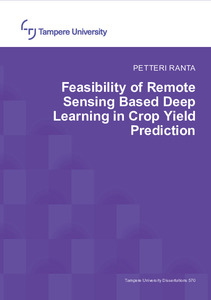Feasibility of Remote Sensing Based Deep Learning in Crop Yield Prediction
Ranta, Petteri (2022)
Ranta, Petteri
Tampere University
2022
Tieto- ja sähkötekniikan tohtoriohjelma - Doctoral Programme in Computing and Electrical Engineering
Informaatioteknologian ja viestinnän tiedekunta - Faculty of Information Technology and Communication Sciences
This publication is copyrighted. You may download, display and print it for Your own personal use. Commercial use is prohibited.
Väitöspäivä
2022-04-01
Julkaisun pysyvä osoite on
https://urn.fi/URN:ISBN:978-952-03-2333-2
https://urn.fi/URN:ISBN:978-952-03-2333-2
Tiivistelmä
In this dissertation the applicability of novel machine learning methods with remote sensing data was studied in the context of agricultural decision support systems in smart farming. The main focus was the utilization of high-resolution unmanned aerial vehicle (UAV) data to perform in-season crop yield estimation with spatial and spatio-temporal deep learning model architectures in a Finnish coastal habitat. While open-access satellite data has already been utilized in crop-related modelling, such as crop type classification and yield prediction, intra-field scale prediction for the smaller fields common in the Nordic countries requires images with higher resolution than currently available from open-access satellite systems. In addition to using UAV remote sensing data, various combinations of crop field related sensor data, data from open-access sources and satellite data were evaluated. Data quality is also an important aspect with remote sensing data, with high altitude satellite-based earth observation suffering from occasional obstructions by the cloud canopy. A decision tree model was employed to estimate cloud coverage by using UAV data as cloudless ground truth. In this dissertation it is shown that crop yield prediction with convolutional neural networks (CNNs) is feasible with high-resolution UAV data and produces results accurate enough for performing corrective farming actions in-season. Using UAV data time series not only improves the modelling performance (post-season prediction) with high-resolution UAV RGB data but also improves the predictive capabilities (in-season prediction). Furthermore, the use of various data sources for crop yield prediction in addition to UAV RGB data is shown to improve the predictive capabilities of the model. In summary, the use of deep learning techniques can be seen to improve the smart farming decision support pipeline by providing performant and reliable decision engines.
Kokoelmat
- Väitöskirjat [4782]
